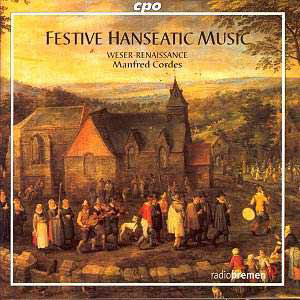This highly interesting disc, which fills an important
gap in the repertoire, is the outcome of a series of concerts given
by the ensemble WESER-RENAISSANCE from Bremen, Germany, during the summer
of 2000. Those concerts were dedicated to the music culture of a topographic
and economic system which no longer exists. The so-called Hanseatic
League not only raised a network of economic prosperity, but also a
flourishing cultural and musical life.
The extracts from the concerts of summer 2000 were
all recorded after the festival in a studio of Radio Bremen. Concentrating
on festive music from the 15th to the 17th century
(for major church feasts, and in some cases on works from the middle-class
sphere), the eighteen works of thirteen composers on this disc have
been grouped together in keeping with geographical criteria. Most of
the works have been recorded for the first time.
The ensemble WESER-RENAISSANCE specialises in the repertoire
of the sixteenth and seventeenth centuries. In this compilation it features
nineteen vocal soloists and twenty-one players on historical instruments,
such as Dulzian, Trombone, Chitarone or Viola da gamba. The sound, as
presented here, is a typical example of sonic clarity and lucidity.
Every single member could be located in the virtual sound room. The
vocal solos project sound both vivid and natural. For some listeners
the resonance might be a bit short, but it gives to the pieces an intimate
atmosphere.
The disc starts with three sacred concertos by Julius
Johannes Weiland (c. 1605-1663), published in Bremen. They are masterpieces
of polyphonic setting and recall in structure similar works by Heinrich
Schütz. Julius Ernst Rautenstein’s (1590/95-1654) dialogue setting
of a text of the Song of Songs, here performed by soprano and
tenor and accompanied by six instrumental soloists, has quasi-operatic
qualities. The double duet, between the two singers on the one hand
and between singers and instruments on the other hand, rises from reserved
tone to a lusty joy in the union of the voices.
Three composers from the Baltic region form the next
group: Heinrich Albert (1604-1651), Andreas Hakenberger (1574-1627)
and Philipp Dulichius (1562-1631). The burial motet "Omnis caro
eut foenum" of the latter develops a fascinating effect of interaction
between words and the dark and deep, atmospheric polyphony.
Equally delightful are the compositions of the two
Schütz pupils Christoph Bernhard (1628-1692) and Matthias Weckmann
(1621-1674). The influence of their mentor could be well heard, but
the organisation of the vocal and instrumental texture is most eventful.
Weckmann’s setting of "Es erhub sich ein Streit im Himmel"
("A battle was waged in heaven") is a gem of renaissance virtuosity.
A jump back in time, almost 150 years, brings us to
the next group, starting with an old Dutch master, Jacob Obrecht (c.1458–1505).
The difference in handling of the voices is evident. The polyphonic
style is stiffer and solid; the development of the musical idea proceeds
through dynamic and rhythmic progress rather than by melodic growth.
This also holds true for the a capella song "Laudamus nunc Dominum"
as well as for Obrecht’s arrangement of the popular Flemish folk song
"T'Andernaken" for winds.
With Orlando di Lasso (1532-1594) we come to the most
prominent composer featured in this compilation. His "Heroum soboles",
written in Antwerp, dates from his early years, from 1556 to be exact,
and is addressed to Emperor Charles V. The text’s servile tone ("Charles,
of heroic lineage, loved by our world, you alone support the Muses’
servants in difficult times" etc.) is performed in the clear and
smooth flow of the six voices.
An interesting subject, the praise of the city of Antwerp
was chosen by Andries Pevernage (1643-1591) for his a capella composition
à 6 voci "Clio, chantons disertement". This
track demonstrates, as no other on this disc, the virtuosity and brilliance
of the WESER-RENAISSANCE vocalists. Their chamber-music-like clarity,
homogeneity of sound and the ability of every single voice to join the
others without each losing its own characteristic timbre is most impressive.
This is an outstanding ensemble, that stands, together with its director
Manfred Cordes, for exemplary interpretations and for varied and true
to style performances.
This is newly discovered repertoire from an almost
forgotten ‘terra incognita’ of music history. It is heartily recommended,
not only to all lovers of renaissance music, but also to everyone who
is open to new and surprising musical experiences.
Uwe Schneider


![]() See
what else is on offer
See
what else is on offer 